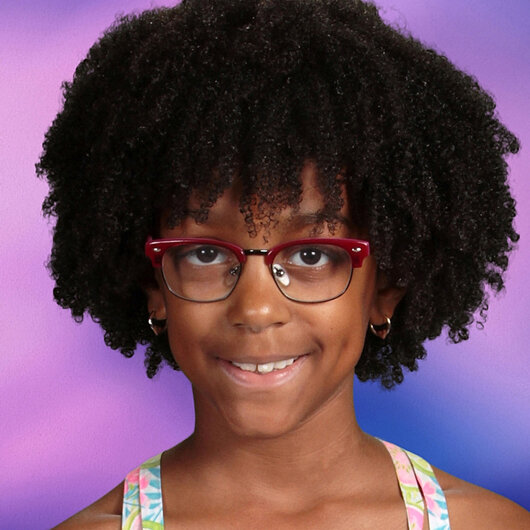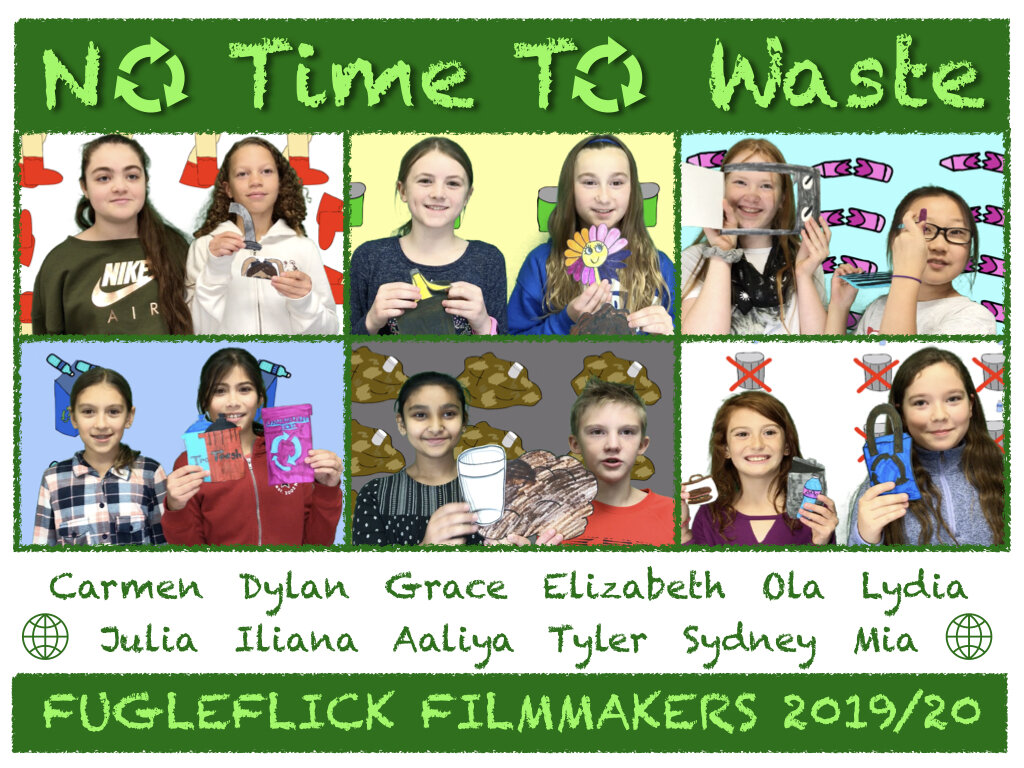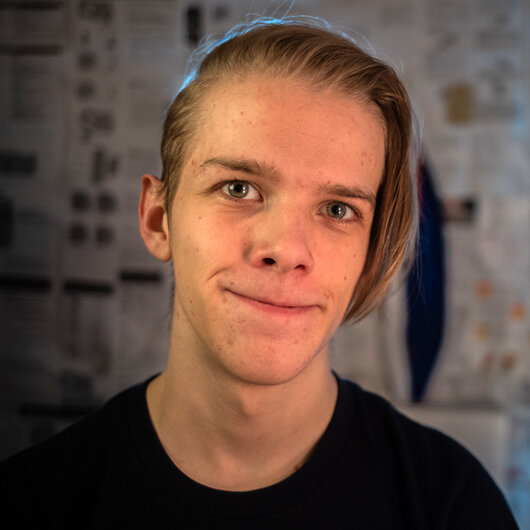By Lisa Biehle Files
Suzie Kang
Recently, South Korean filmmaker Bong Joon Ho swept the 92nd Academy Awards, opening the door for a cross-cultural vision in cinema. Meanwhile, the One Earth Young Filmmakers Contest had a parallel surprise. Suzie Kang took the top prize at the post grad level for her animated film "Vandals." From South Korea originally, she graduated from New York University's Tisch School of the Arts last spring.
Suzie’s story about plundering nature’s beauty was just one of 196 total submissions from students ages 8 to 25 this year. Last year, there were 157 entries. The rules vary depending on the age level, but entrants are asked to create a 3-to 8-minute environmental film that inspires or promotes action. Prizes range from $100 to $1,000, with three new $1,000 prizes this year for post grad, animation, and creativity.
Entries flow in from across the country all year with an early January deadline. Then a jury of 19 filmmakers and environmental activists review the films to arrive at finalists and prize-winning films. These top films will premiere as a part of the One Earth Film Festival at the awards event at 10:30 a.m. Saturday, March 7, at the Gene Siskel Film Center, 164 N. State St., in Chicago. Free gourmet coffee, hot chocolate, and popcorn will be available for all attendees at this free event. Reserve tickets here.
Honorable Mention films will be announced separately.
Elementary School Tie
($100 each + matching gifts donated to Faith in Place ($50) for environmental initiatives, Morton Arboretum ($50) and #teamtrees ($100))
Zoë Nevels
“We Can All Help the Earth!” (5 min)
Zoë and Jada Nevels
Grades 3 and 2, Mann Elementary School
Oak Park, Ill. + Homeschool
Jada Nevels
Sisters Zoë and Jada use stop-motion, green-screen, and live action in their five-minute film to explain how electricity is produced, the dangers of using too much fossil fuel, and what each of us can do to reduce our carbon footprint. With the help of lively music and their own charisma, the girls explain the clean energy options and small steps we each can take in our everyday lives. In their contest entry, Zoë disclosed her motive for entering was to learn more about the environment and have fun while doing it!
“No Time to Waste” (3 min)
Lydia An, Aaliya Baig, Mia Cinkler, Sydney Groh, Elizabeth Katsov, Dylan Knight, Grace Lisy, Carmen Lozano, Aleksandra Parobi, Iliana Rustandi, Julia Tita and Tyler Ubert
Grade 5, Dryden Elementary School
Arlington Heights, Ill.
Through joyful poetry, drawings, song and dance, this group of 5th grade students created a message around the quotation from Greta Thunberg: “You’re never too small to make a difference” (see lyrics below). In their three-minute film, the group demonstrates abundant ways to make a small impact, from repurposing old crayons to tossing lunch scraps into a compost barrel. On a green screen behind, vibrant digital drawings illustrate the content while beautiful paper cut-out drawings reinforce the message to recycle, reuse, compost, walk and bike.
5th grade students from Dryden Elementary School in Arlington Heights, Ill., created “No Time to Waste.” Their art teacher is Tricia Fuglestad.
You are Never Too Small to Make a Difference
You are never too small to make a difference.
All of our efforts together many influence
Change.
Can’t waste time,
We only have one world to live in.
Let’s change this time,
See problems and solutions.
Recycle, re-purpose, don’t waste resources,
Reuse and compost, don’t litter,
No time to waste.
--Song from the film “No Time to Waste”
Middle School
($200 + $200 matching gift to donate to Fridays for Future)
Maia Nelson
“The Sad Truth: How Climate Change is Changing Our Lives” (8 min)
Maiana Nelson
Grade 8, L.J. Hauser Junior High School
Riverside, Ill.
Maia takes on the topic of climate change in her eight-minute film, explaining that the consequences are actually extreme weather events rather than simply global warming, as seen in increased flooding, fires, hurricanes, and tornadoes. She interviews a marine biologist in Venice, one of the top six locations affected globally by climate change, to find out how people cope with these challenges. Maia intersperses stop-motion Legos to demonstrate how melting glaciers cause sea level rise. Her list of solutions is long and broad, including voting and protesting in addition to composting and recycling.
In her contest entry, she wrote: “This is the worst period of species die out since the loss of dinosaurs, and it is all because of humans and our choices. Just as much as this is our problem, it needs to be our solution, too. This is a crisis, and humans need to wake up and realize that now is the time to act. Now is the time to make a change. Now is the time to save our planet and our futures.”
High School
($350 + $350 matching gift to donate to Plastic Oceans)
Nathan Goswick
“Plastic Bags” (3 min)
Nathan Goswick
Grade 11, Joplin High School, Joplin, Mo.
Nathan’s fast-paced, concise message is a simple one: bring a tote and recycle any stray plastic bags you see. He conveys this through inventive editing and sound in his three-minute film. With a sense of urgency, he questions how we let 100 billion plastic bags be thrown away each year with only 0.6% recycled? Images swipe across the screen to keep his message moving apace. Sound effects of bubbling crude oil and soft crunching plastic bags are particularly effective. The opening and closing sequences of a bag blowing under steely skies accompanied by somber cello music in the beginning, then a more hopeful violin at the end, illustrate this tragedy artfully. “I care deeply about our environment, as well as have a passion for video,” wrote Nathan in his contest entry. “This competition was a perfect mix of these two things, and that made me love working on this film so much.”
Animation Tie/Split
($500 each + $500 matching gifts to donate to Sierra Club Foundation and World Wildlife Fund)
Marin Chalmers
Note: Normally this $1,000 prize would go to a college student, but the jury was impressed by two exceptional animated/stop-motion films from younger students who showed story-telling and/or technical skills well beyond their years and decided to split the prize between them.
“Walking for a Happier Earth” (3.5 min)
Marin Chalmers and Daniela Arezina
Grade 7, Roosevelt Middle School, River Forest, Ill.
Daniela Arezina
With a background of upbeat Ragtime music, Marin and Daniela list exactly how pollutive cars can be before purchase, during use, and after they are scrapped. In their three-minute stop-motion film, colored pencil cut-out drawings, Legos, small toys, and stuffed animals convey the message to walk, bike, or take the train instead of using a car. Paper cut-out footprints cleverly parade across the screen listing facts and figures about carbon footprint. Marin and Daniela entered the contest because, “We saw previous submissions and winners of the contest and loved how kids just like us were having their voices heard and were helping to make the world a better place.”
“You Reap What You Sow” (3 min)
Jacob Updyke
Grade 11, Millburn High School, Short Hills, NJ
Jacob Updyke
“I made this film to alert the world about the unfolding climate catastrophe,” Jacob wrote in his contest entry. A mournful violin and piano coupled with stark black and white images set the stage for this powerful, three-minute animation. A mother and son are evacuating a city, and the young boy asks for an explanation. What follows is the story of Man and his destruction of what was once pristine. This film unapologetically offers a glimpse into a bleak future if we do not address the destruction of our environment. The only use of color appears in a startling scene at the conclusion.
College/University
($1,000 scholarship + $1,000 matching gift to donate to Amazon Watch)
“Yasuni National Park: The Real Power Belongs to the People” (7 min)
Oriana Camara
Senior, Wheaton College, Norton, Mass.
Oriana Camara
Ecuador’s Yasuni National Park, home to 5,000 species of plants and animals, sits on top of nearly a billion barrels of crude oil. Oriana’s seven-minute film tells the story of this dilemma through the gentle voice of an Indigenous man who considers the forest his home. Accompanied by fluid piano music, the camera lovingly takes in the beauty of the Amazon rainforest from industrious ants to exotic birds to cascading waterfalls and green mountains. The formerly protected park has been open to encroaching oil and agricultural companies since 2013. At the film’s conclusion, Greta Thunberg’s clear voice rings the alarm about fossil fuel extraction and the climate crisis. Wrote Oriana in her contest submission: “For me personally, documentary film is the opportunity to propel forward change, an open dialogue, and a message.”
An artist sells his wares in “Vandals,” the Post Graduate Award winner.
Post Graduate
($1,000 + $1,000 matching gift to donate to The Nature Conservancy)
“Vandals” (6 min)
Suzie Kang, April Chang, and Emily Wong
Recent graduate, New York University (Tisch School of the Arts), NY
Entirely without dialogue, this engaging six-minute animation conveys its message via sensitive imagery, music and sound effects. The film begins when a landscape artist has trouble selling his paintings. By accident, he figures out how to magically capture beautiful scenes from nature in jars, and a thriving business ensues. The artist transforms into a salesman, traveling the globe to capture colorful fields of flowers, desert cacti, jungle plants and even the Northern Lights for market. When skies turn gray, he realizes he can’t capitalize on nature without consequence and attempts to right his wrong.
Sally Stovall “Planet Warrior” for Creativity
($1,000 + matching gift donated to The Rainforest Alliance ($300) and Farm Fresh Rhode Island ($700))
“Lucy” (2 min)
Tara Gupta
Recent graduate, Rhode Island School of Design, RI
Tara Gupta
Tara’s almost two-minute film is a concise animation in mostly black and white with a few bold, primary colors. Her message is a simple one about the relationship between Mother Earth and humankind, personified as Lucy (in a nod to the 3.2 billion-year-old australopithecine). Tara animates deftly when an Earth on fire transforms into a woman’s angry eyes and then shrinks to the minute face of an escapee in a rocket ship. She wrote in her contest entry: “I hope to share this film and help initiate a dialogue around the way we maintain our relationship to the Earth, especially as we young filmmakers and media consumers come of age and have the opportunity to reshape this relationship.”
“Lucy” won the Sally Stovall Planet Warrior Prize for Creativity. In this scene, Mother Earth speaks lovingly to Lucy, the australopithecine representing humanity.
Winning films are now available to watch on this page.














